Tuesday:
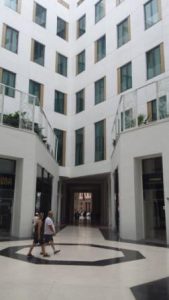
Jean-Paul and Alicia are at breakfast, its their last day here. She works for a diamond firm doing admin and assessing gems. Shes held some very expensive diamonds in her hands and tells me that they come in all colours. When I mention the synthetic diamonds, shes quick to point out that even though occlusions can be fitted into the gems, they can be easily recognised for the way their points are slightly rounded whereas the real thing has sharp angles.
Its a long walk to the other side of the Old Town. All along the way repair and restoration work is going on sporadically. Many large 19th century buildings have been gutted and remain fenced off with an architects photoshop of what its all going to look like.
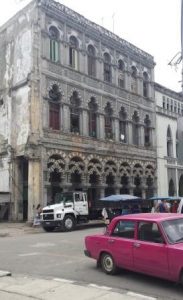
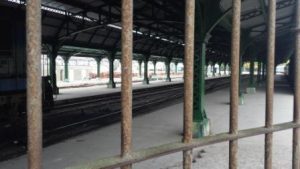
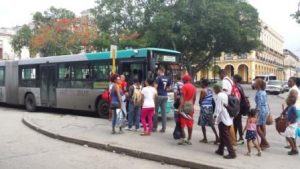
Many, like the Palace of the Ursulines remain untouched.
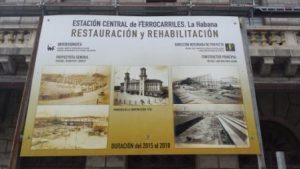
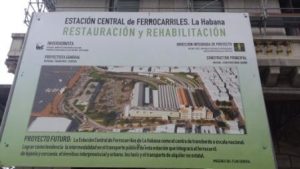
I pass the Central Railway station which looks as if trains dont run here any more. The terminal building was once impressive and there are pictures of it being built in the 1900s and an impression of what it will look like when restored. Martís birthplace is around here somewhere.
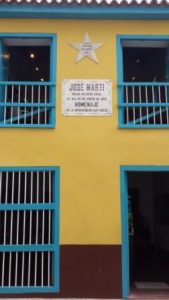
Its a small house brightly painted in yellow and blue. Theres a bit of a panic when I enter as there is no ticket office and the entrance fee is 3 cuc. The place is over staffed and they dont seem to know what to do with me while they go and get change. I suspect its free for Cubans. This modest house contains photographs of Martís parents, his childhood and personal items he may have used, like cutlery. The captions are entirely in Spanish, so theres a bit of guesswork involved. There are pictures of Martí at different times of his life and in different countries, but no sense of narrative about his work.
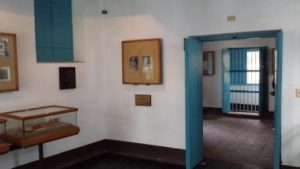
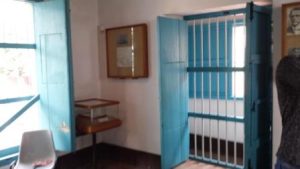
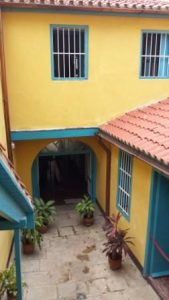
With my trusty map, I head off in search of Simon Bolivar, another hero of South America. I fancy walking along the Bay of Havana, where the piers are. The offers of taxis continue unabated, particularly as I approach regenerated pockets. I spot a huge warehouse which seems lively.
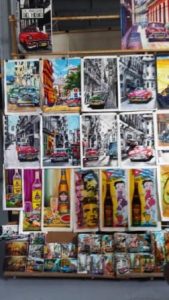
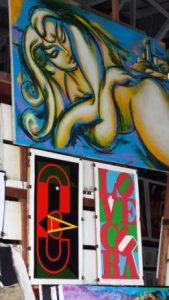
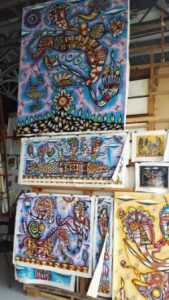
Its full of arts and craft stalls; painting, leatherwork, woodwork and of course tee shirts and souvenirs. I decide its time for me to get a Ché Guevara tee shirt and spot a green one; its very good quality. Ive already resolved to go though a green phase, so even though I pay too much for it, Im content. I continue my search for Simon Bolivar, thinking to look at the ancient Convent of Santa Clara. It is indeed crumbling and closed in spite of being marked as a museum on the map.
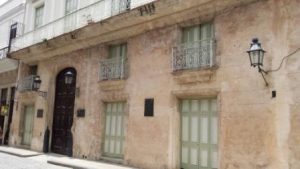
I do find the house of Simon de Bolivar, but its not open to visitors I have to make do with a statue of him across the road. I discover the delightful Plaza Vieja where the heat overcomes me and I have to sit down. The Coffee place is over subscribed so I order a Limonada naturel at the almost deserted café next door.
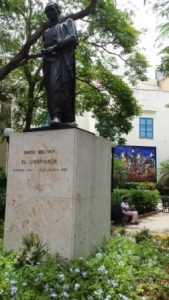
A local woman sits at my table complaining about the crowded coffee shop and the heat. After a moment she starts going on about coke. I get the impression that she wants me to buy her a coke, but I profess no Espanol. She persists, asking for 2.50 cuc and eventually I relent but go into the café, find a can of coke from the refrigerated cabinet and take to the counter. Its actually 2.75. I tell her coke is very bad for her, full of sugar, but she takes no notice and disappears the moment shes got it. I imagine that it was the 2.50 she wanted and not the coke. Time to move on to the Plaza di San Francico di Asis where theres a huge bank over the plaza from the church with a funky sculpture of a seated couple.
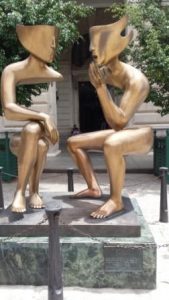
This part of the city really is the place for tourists, most of it has been restored and if youd not been in Central Habana, you would have a very different impression. This is where the cruise liners berth, guided tours are everywhere and its difficult to find a café that doesnt do a full course lunch. A plain looking place, with cheaper prices looks worth a try. A few back-packers are eating. One couple have to go up to the counter and the service is hopeless. I do manage to attract the waiters attention and order a beef burger and a beer. The local beer listed on the menu is not available, only the more expensive imported stuff. Its still reasonable and the burger is very hot.
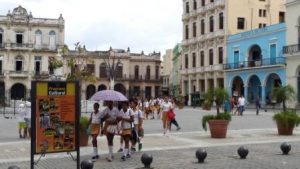
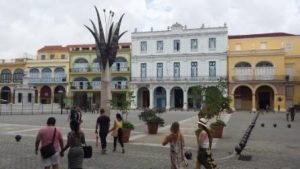
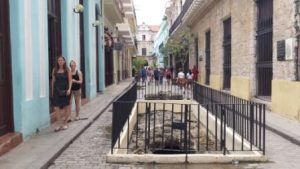
I have to go up to the counter to pay as there is no hope of attracting the waiters attention.
Ive lost track of the number of times Ive been offered cigars.
I dont smoke I say several times until they get the message. Gave up 25 years ago, I say. Theres a few that suggest I buy gifts for friends, but I cant think of anyone who smokes cigars. I decide to take a tricycle taxi back to my digs for the experience and its hot. I spot one at a corner. They line up in order like regular taxis. This guy is eating sweet corn for lunch. He knows where my street is and its a fair way. Hes been on holiday to Moscow although he didnt seem to think there was much for him to do there and he found the Russians very dull, not like the Cubans, he says.
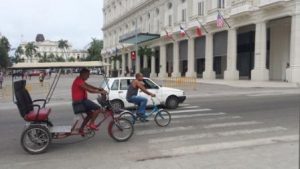
Hes only in his twenties and I wonder how a Tricycle taxi driver can afford to go there on holiday. Later in the evening I return to Café Neruda. Wayne is there alone out the front looking very red in the face possibly sunburn. He doesnt recognise me from yesterday, so I go in and find a table in the shade. Travelling alone, Ive become a watcher of people their body language tells a story. A very beautiful young man, tanned and skinny comes in with a pretty blond girl. She gently caresses his forearm as they wait for their food. There are a couple of young English guys who have come out smelling of soap in crisp shirts, shorts and loafers. I can tell they are English by the shapes their mouths make when they speak. English public school I think. They have a relaxed familiarity in close proximity, but not quite touching. They may be a couple, but more likely to be school chums. The taller one is fair with slightly curly hair and an ironic, hard to amuse air about him. Hes not handsome, a bit like a younger Jeremy Paxman. The shorter one has dark-brown hair, olive skin and a charming smile. He looks up somewhat adoringly at his friend as they flick through their Cuba guide-book.
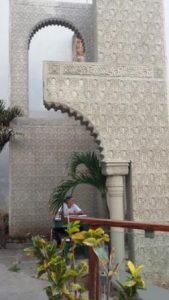
A family is near the entrance steps. Shes pretty and breast feeding her son. Hes tall, skinny, bearded wears glasses and anxiously looks after his urchin-like daughter. They are eating dinner and the wife is having a glass of red wine. They are Spanish-speaking and are fully engaged in entertaining and comforting their children. Suddenly Im aware that he has fingers and parts of fingers missing from both hands. I imagine some sort of accident as a child. Amongst this diverse clientele the middle aged waiters saunter, balancing three or four bottles of beer in one hand. Traffic passes on the Malecón and the sun goes down. Back on the b&b roof terrace yet another couple from New York have arrived. Hes a red-head and shes originally from Venezuela. They are having money problems. They are used to travelling with credit and debit cards and hadnt imagined that there would be so few opportunities here. American express, which they use, is not accepted here at all. Shes talking to Barbara about the problem but the b&b cant do credit cards the bookings are all done from abroad, somehow. Suddenly he shouts out that hes got his magic money and flips out 5 £100 bills. Ive got the money from my magic trick. Hes a magician. I thought that was fake money, she says. I recon the audience would want to check it out. I add. He nods in agreement.
Wednesday
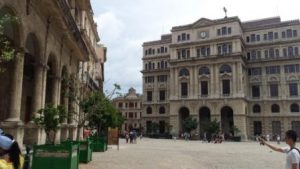
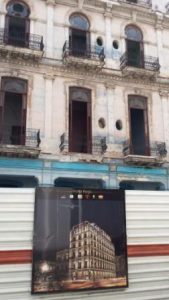
I think Ive just about exhausted Habanas treasures and set out back to the arts centre for more t-shirts and decide this time to stick to the water-front known as the Bay of Habana,
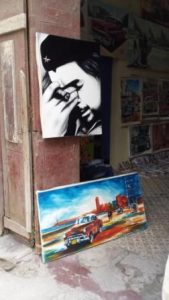
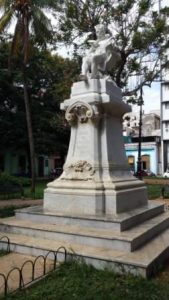
I look at random artists studios as I go and pass a statue of Cervantes. Theres a modern building with an up-stairs café where locals gather. Its patronised by women in Department of Customs uniforms on a break. I get a coffee and watch. Along the bay is a huge wharf which is in need of restoration and I can spot a gold onion dome of what must be a Russian Orthodox Church. The ferries also dock here, ancient vessels that chug across the bay to the other side. I take some time to look at the embarkation of passengers, not dissimilar to the Waiheke Ferry bikes, shopping and people.
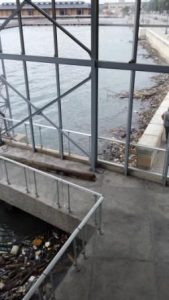
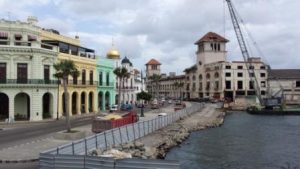
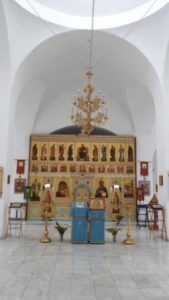
Theres a disappointing collection of garbage collected in the water around the ferry building. Making my way along the road, I find the Russian church is open and, more because Phillip would have had a look, I go in. Further on I discover another plaza restored for the tourists, with the colourful black cigar women and I find a statue of the father of Cuba de Cespedes in Plaza de Armas. This also contains the Castillo de La Real Fuerza, which Id failed to find yesterday. Its full of Spanish history revolving around the Amada. There are models of Spanish ships, samples of gold and treasure plus some good views from the battlements. On one side of the Plaza is the palace of the Governors of Habana the Cassa de Gobierno Palacio Municipal from 1791 – 1898.
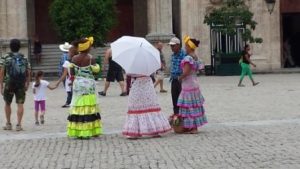
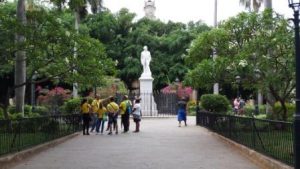
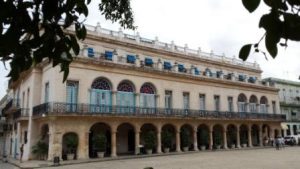
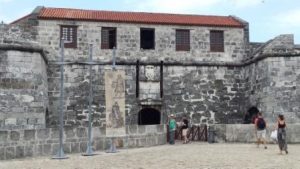
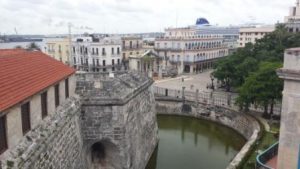
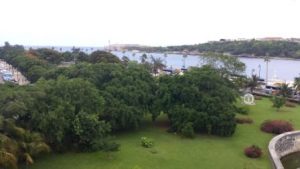
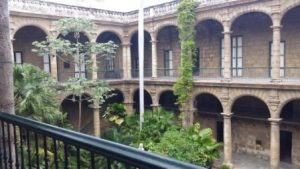
Later it becomes the municipal offices of Habana to 1959.Its got carriages and guns on the ground floor. On the upper floor surrounding a peaceful courtyard are the state rooms. A female attendant wants to point everything out to me.
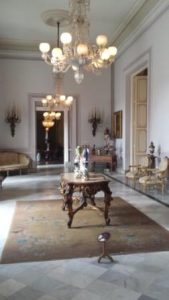
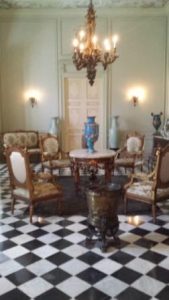
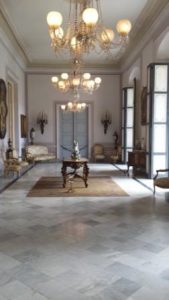
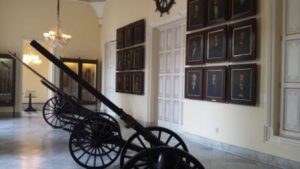
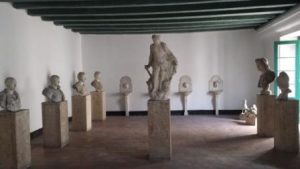
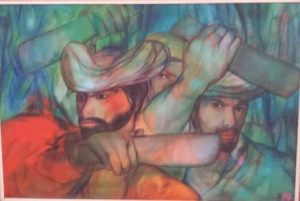
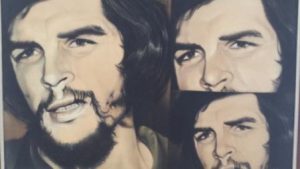
Theres a green room, a smoking room etc with French china vases, Italian marble and so on. It is beautifully presented and of course she gets her tip in support of the Cuban people. There is also art and a collection of marble busts from the Roman era.
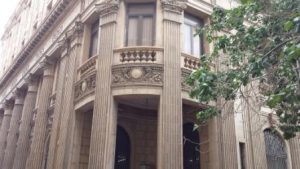
I notice an impressive building once belonging to the Bank of Nova Scotia and think of my cousin there who loves this country.
My last images of Cuba have to be this street art on the walls Banksie style.
Cuba Post Script
Just as Im leaving the USA 16 June 2017, I post on Facebook.
Sitting here eating empanadas and trying not to throw-up. Trump is live on CNN revoking Obama’s deal with Cuba. Using the most disgustingly patronising propaganda. Backed by a cheering clapping crowd he manipulates with emotive language and the Star Spangled Banner on a single violin. Think I might have been to Cuba just in time.
Hes talking about human rights abuses and his concern for the best interests of the Cuban people who have been repressed. I didnt see any of that though they probably exist. I also havent seen the overcrowded US prisons with thousands on death row. Cuba is about ordinary people making the best of what theyve got. As my driver, Maria, said on the first day Its complicated and listening to the President on the television, he clearly has no idea.
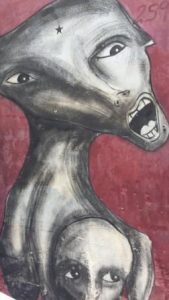
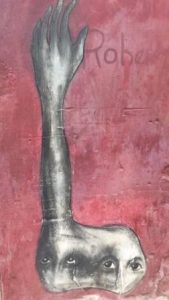
Thank you for the tour. I loved the images (by pic and by word).